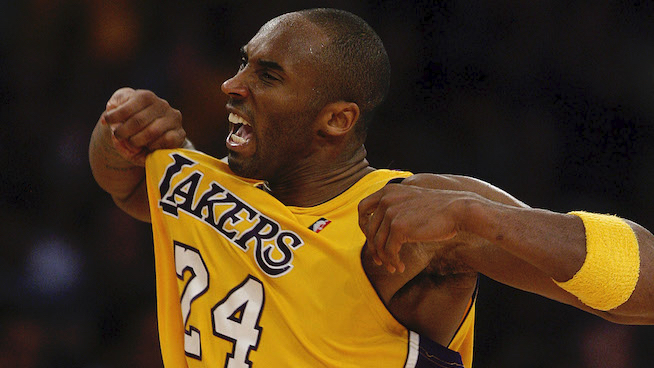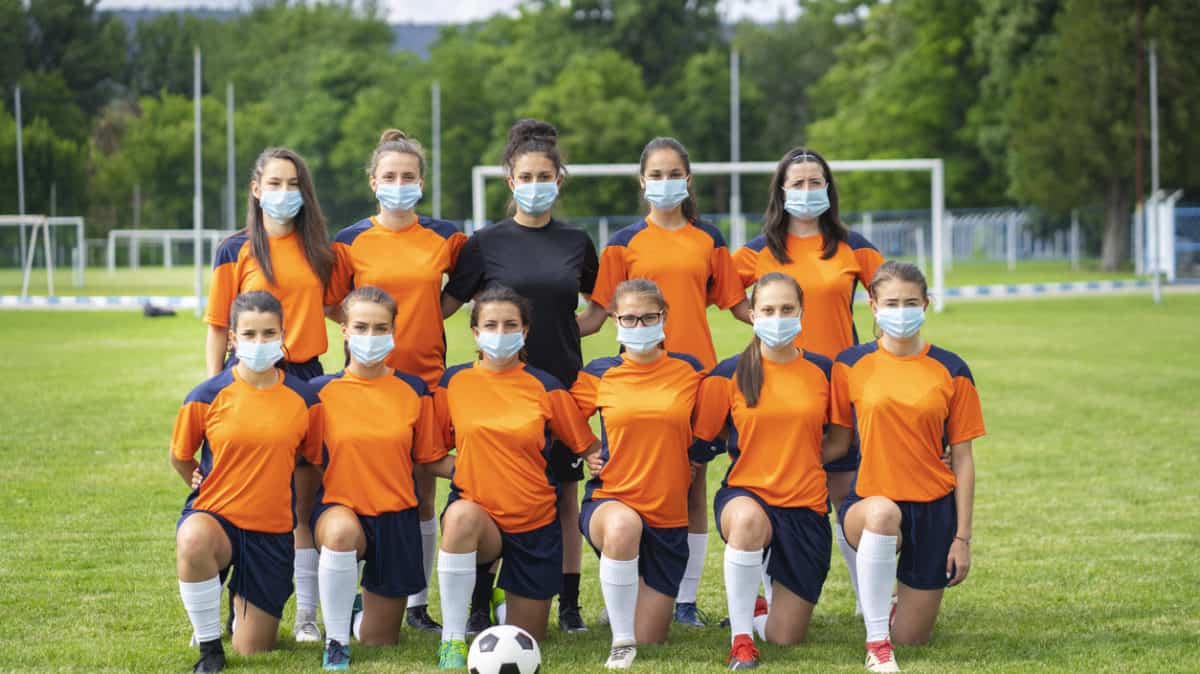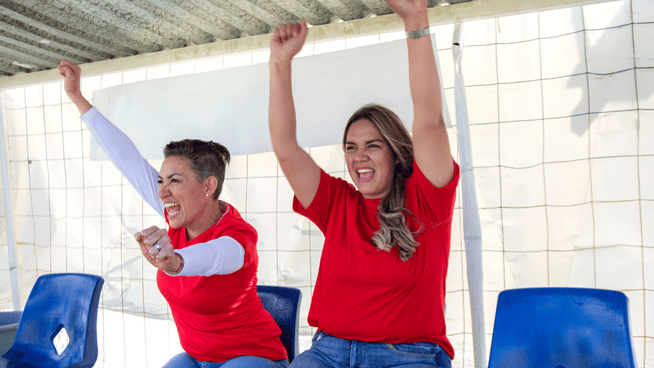Recruiting Advice From Tony Gonzalez
Apologies if you’ve been bombarded with application questions and essays recently, but here’s one more: Describe the situation in whichan athlete plays in a football game during the day, then suits up with his basketball team for a night contest. Further explain how you’d detail the situation in which the same athlete, later in his scholastic career, plays on the gridiron during the day, then catches a night flight to Hawaii for a basketball game being played the next day.
For Atlanta Falcons TE Tony Gonzalez, his answer is summed up with one word: college. This shouldn’t surprise, though, because Gonzaelz’s entire athletic experience has been one large Hall-of-Fame application.
In detail, how have you developed as a player over the years?
Growing up, Gonzalez never envisioned playing football or basketball professionally, in college or even in high school. “I played Pop Warner football, and I wasn’t really good at all,” he laughs. “It was $117back then to play, and you’re supposed to get at least six plays agame. I couldn’t even get on the field for the minimum.” Throughout his illustrious gridiron career, Gonzalez has earned back his entry fee—thousands of times over.
Though he lacked confidence heading into high school, the soft-spoken Gonzalez ascended to the football and basketball varsity teams by his sophomore year. Then the recruiting letters started descending from the best football and basketball coaches in the nation. The dual-sport star reflects on this overwhelming attention: “I pretty much had my choiceof any football school in the country, and in basketball it wasn’t any school, but a lot of major universities.”
What was the most difficult decision of your life, and how did you reach it?
Gonzalez professes his love for both sports, but admits that as a high school athlete, he favored basketball. “With basketball, I could go tothe gym and there would be nobody else there, so I could spend hours bymyself shooting baskets and clearing my head from other things thatwere going on,” he says. “With football, you can’t go get a pick-upgame or go practice by yourself.”
And though he enjoyed both sports, outsiders and critics pressured Gonzalez to choose one. “I made it clear from the beginning that if you’re interested in me, you’re going to have to allow me to play both sports,” says the two-sport high school All-American. “Eventually, I was getting calls from the head football and basketball coaches fromschools and they would say, ‘Hey you’re allowed to do whatever you want; if you want to play both sports, that’s fine. If you want to play one sport, that’s fine, too.’”
Gonzalez warns that, throughout life, every athlete face tough decisions. “There are going to be people—who are even close to you—telling you that ‘You can’t do it.’ The secret, though, is if youwant to be good at something, you better refuse to be average.”
What is your approach to setting goals?
The perennial Pro Bowler initially believed the odds of making it professionally were stacked against him. “I remember when I was getting recruited in high school, I said to myself, ‘Wow, I get to go to college, and then after that I’ll get a job,’” Gonzalez says. “I never was one of those guys who talked about going to the league … I wanted to have fun. But don’t get me wrong, I worked my butt off.”
After 13 successful years in the NFL, the wise veteran still enjoys every single day as a professional. “I don’t think you should look ahead, because if you do, you’ll miss ‘now,’” he says. Recognizing how quickly every moment passes, Gonzalez slows it all down: “Right now, I’m concentrating on how good I can be today. Enjoy today, because you never know—tomorrow might not come.”
Describe your most rewarding experience.
The two-sport standout claims that one of his most rewarding accomplishments was the aforementioned double-dip, single-day duty he pulled off as a tight end/power forward for the California Golden Bears. He recalls, “It was one of those things. I was young and had so much energy back then.” Asked about his reputation as one of the best tight ends in history, he responds: “It’s flattering, but it’s one ofthose things that I’ll take more satisfaction in when I get doneplaying. Right now, I don’t want to think about it. Even after 13 years, I just want to improve.”
Appropriate responses from a man focused on the present, not the past or the future. Canton application approved.
Although his recruiting process as an elite two-sport athlete may have been different from yours, Gonzalezstill had to get through it then choose from his list of schools. Here, he bestows his words of recruiting wisdom. His experiences tie directly in to the 10 sections of our Recruiting Guide.
Academics
It was hard at Berkeley, because teachers and professors aren’t really into sports there. They definitely did not cut breaks. Even though you had a game that weekend, you had to turn in a test or paper on time like everybody else. Keep in mind, as a college athlete, there isn’t a life outside of academics and your sport. College sports are a year-round commitment; there’s never time to relax and . . . just be a “normal student.”
Gauging Interest
I got my first letter my sophomore year in high school, from the University of Colorado. I still remember it, because it was my first hand-written letter. Those are the ones that really count, because it means the coach took the time to actually write you one. It shows that he’s focused on you versus something they send out to a lot of potential recruits. By my senior year, I was getting a stack a week.
Self Marketing
I think what [attracted coaches] were my size—being…a 6’4”, 6’5” guy who was able to run a 4.8 in high school and get down the middle of the field—[and] my athleticism really stood out, and [that] was something I carried with me throughout college. Basketball helped my jumping, stopping, hand-eye coordination and getting open on the court. Football developed my aggression and toughness. Eventually, when I was getting scouted by NFL teams, they were actually coming to my basketball games to gauge my athleticism.
Communicating With a Coach
If you’re getting recruited, tell a coach what you want if you’re in that position. One thing I made clear from the beginning is that I wanted to play both sports in college.
After I decided to attend Cal Berkeley, I had to call coach Lute Olson to rescind my verbal commitment [for basketball] to Arizona. I didn’t want to have to do it, and I actually wanted my parents to do it. But my mom said, “No you’re going to do it; you made your bed, now lie in it.” It was a tough call, but it’s a growing situation. You got to face up and be a man about it.
College Visits
I took some unofficial trips, but I only took two official trips. You get five trips, so you might as well use them … I took some unofficial trips to Arizona State, USC and UCLA. In retrospect, I think I should’ve taken a few more trips to some schools back east, like Florida State, Florida and Miami.
You need to get on a campus that you feel comfortable with. For every trip, I recommend talking to people on campus. Take your hosts aside and ask them, “Now that the coaches aren’t here, tell me exactly how it is here.” Enjoy the whole process, because those were some of the best days of my life as far as sports go.
Researching Colleges
Right away, you better look at the academic part of [a school] and see how, scholastically, the school performs. Focus [on] the graduation success rate of the athletes. Pro sports aren’t promised to anybody, so you better make sure you have a backup plan, and take the academic part of it very seriously—otherwise you’re going to be caught out in the cold.
Cal Berkeley definitely [gave me] a degree, [so that] if football or basketball didn’t work out, I could go on and be really successful in something else. That was the deciding factor. I verbally committed to play for the University of Arizona, and they eventually won the National Championship in basketball … if I was just thinking in terms of that, I probably could’ve went to Arizona, but I’m glad with the decision I made.
Related Links:
Recruiting Lingo
Financial Aid Breakdown
College Divisional Breakdown
Year-By-Year Academic Requirements
Recruiting Interactions With College Coaches
How to Make the Most of College Visits
Tips for Researching Colleges
Overnight Campus Visit Checklist
How to Proactively Recruit Yourself
2010 Recruiting Checklist
RECOMMENDED FOR YOU
MOST POPULAR
Recruiting Advice From Tony Gonzalez
Apologies if you’ve been bombarded with application questions and essays recently, but here’s one more: Describe the situation in whichan athlete plays in a football game during the day, then suits up with his basketball team for a night contest. Further explain how you’d detail the situation in which the same athlete, later in his scholastic career, plays on the gridiron during the day, then catches a night flight to Hawaii for a basketball game being played the next day.
For Atlanta Falcons TE Tony Gonzalez, his answer is summed up with one word: college. This shouldn’t surprise, though, because Gonzaelz’s entire athletic experience has been one large Hall-of-Fame application.
In detail, how have you developed as a player over the years?
Growing up, Gonzalez never envisioned playing football or basketball professionally, in college or even in high school. “I played Pop Warner football, and I wasn’t really good at all,” he laughs. “It was $117back then to play, and you’re supposed to get at least six plays agame. I couldn’t even get on the field for the minimum.” Throughout his illustrious gridiron career, Gonzalez has earned back his entry fee—thousands of times over.
Though he lacked confidence heading into high school, the soft-spoken Gonzalez ascended to the football and basketball varsity teams by his sophomore year. Then the recruiting letters started descending from the best football and basketball coaches in the nation. The dual-sport star reflects on this overwhelming attention: “I pretty much had my choiceof any football school in the country, and in basketball it wasn’t any school, but a lot of major universities.”
What was the most difficult decision of your life, and how did you reach it?
Gonzalez professes his love for both sports, but admits that as a high school athlete, he favored basketball. “With basketball, I could go tothe gym and there would be nobody else there, so I could spend hours bymyself shooting baskets and clearing my head from other things thatwere going on,” he says. “With football, you can’t go get a pick-upgame or go practice by yourself.”
And though he enjoyed both sports, outsiders and critics pressured Gonzalez to choose one. “I made it clear from the beginning that if you’re interested in me, you’re going to have to allow me to play both sports,” says the two-sport high school All-American. “Eventually, I was getting calls from the head football and basketball coaches fromschools and they would say, ‘Hey you’re allowed to do whatever you want; if you want to play both sports, that’s fine. If you want to play one sport, that’s fine, too.’”
Gonzalez warns that, throughout life, every athlete face tough decisions. “There are going to be people—who are even close to you—telling you that ‘You can’t do it.’ The secret, though, is if youwant to be good at something, you better refuse to be average.”
What is your approach to setting goals?
The perennial Pro Bowler initially believed the odds of making it professionally were stacked against him. “I remember when I was getting recruited in high school, I said to myself, ‘Wow, I get to go to college, and then after that I’ll get a job,’” Gonzalez says. “I never was one of those guys who talked about going to the league … I wanted to have fun. But don’t get me wrong, I worked my butt off.”
After 13 successful years in the NFL, the wise veteran still enjoys every single day as a professional. “I don’t think you should look ahead, because if you do, you’ll miss ‘now,’” he says. Recognizing how quickly every moment passes, Gonzalez slows it all down: “Right now, I’m concentrating on how good I can be today. Enjoy today, because you never know—tomorrow might not come.”
Describe your most rewarding experience.
The two-sport standout claims that one of his most rewarding accomplishments was the aforementioned double-dip, single-day duty he pulled off as a tight end/power forward for the California Golden Bears. He recalls, “It was one of those things. I was young and had so much energy back then.” Asked about his reputation as one of the best tight ends in history, he responds: “It’s flattering, but it’s one ofthose things that I’ll take more satisfaction in when I get doneplaying. Right now, I don’t want to think about it. Even after 13 years, I just want to improve.”
Appropriate responses from a man focused on the present, not the past or the future. Canton application approved.
Although his recruiting process as an elite two-sport athlete may have been different from yours, Gonzalezstill had to get through it then choose from his list of schools. Here, he bestows his words of recruiting wisdom. His experiences tie directly in to the 10 sections of our Recruiting Guide.
Academics
It was hard at Berkeley, because teachers and professors aren’t really into sports there. They definitely did not cut breaks. Even though you had a game that weekend, you had to turn in a test or paper on time like everybody else. Keep in mind, as a college athlete, there isn’t a life outside of academics and your sport. College sports are a year-round commitment; there’s never time to relax and . . . just be a “normal student.”
Gauging Interest
I got my first letter my sophomore year in high school, from the University of Colorado. I still remember it, because it was my first hand-written letter. Those are the ones that really count, because it means the coach took the time to actually write you one. It shows that he’s focused on you versus something they send out to a lot of potential recruits. By my senior year, I was getting a stack a week.
Self Marketing
I think what [attracted coaches] were my size—being…a 6’4”, 6’5” guy who was able to run a 4.8 in high school and get down the middle of the field—[and] my athleticism really stood out, and [that] was something I carried with me throughout college. Basketball helped my jumping, stopping, hand-eye coordination and getting open on the court. Football developed my aggression and toughness. Eventually, when I was getting scouted by NFL teams, they were actually coming to my basketball games to gauge my athleticism.
Communicating With a Coach
If you’re getting recruited, tell a coach what you want if you’re in that position. One thing I made clear from the beginning is that I wanted to play both sports in college.
After I decided to attend Cal Berkeley, I had to call coach Lute Olson to rescind my verbal commitment [for basketball] to Arizona. I didn’t want to have to do it, and I actually wanted my parents to do it. But my mom said, “No you’re going to do it; you made your bed, now lie in it.” It was a tough call, but it’s a growing situation. You got to face up and be a man about it.
College Visits
I took some unofficial trips, but I only took two official trips. You get five trips, so you might as well use them … I took some unofficial trips to Arizona State, USC and UCLA. In retrospect, I think I should’ve taken a few more trips to some schools back east, like Florida State, Florida and Miami.
You need to get on a campus that you feel comfortable with. For every trip, I recommend talking to people on campus. Take your hosts aside and ask them, “Now that the coaches aren’t here, tell me exactly how it is here.” Enjoy the whole process, because those were some of the best days of my life as far as sports go.
Researching Colleges
Right away, you better look at the academic part of [a school] and see how, scholastically, the school performs. Focus [on] the graduation success rate of the athletes. Pro sports aren’t promised to anybody, so you better make sure you have a backup plan, and take the academic part of it very seriously—otherwise you’re going to be caught out in the cold.
Cal Berkeley definitely [gave me] a degree, [so that] if football or basketball didn’t work out, I could go on and be really successful in something else. That was the deciding factor. I verbally committed to play for the University of Arizona, and they eventually won the National Championship in basketball … if I was just thinking in terms of that, I probably could’ve went to Arizona, but I’m glad with the decision I made.
Related Links:
Recruiting Lingo
Financial Aid Breakdown
College Divisional Breakdown
Year-By-Year Academic Requirements
Recruiting Interactions With College Coaches
How to Make the Most of College Visits
Tips for Researching Colleges
Overnight Campus Visit Checklist
How to Proactively Recruit Yourself
2010 Recruiting Checklist
RECOMMENDED FOR YOU
Create A Free Recruiting Profile Today!
CaptainU helps athletes & parents not only be proactive but also to manage and take control of their entire recruiting journey.











